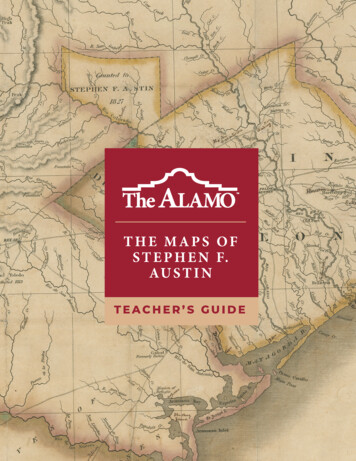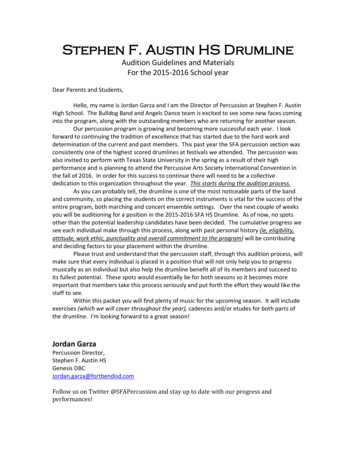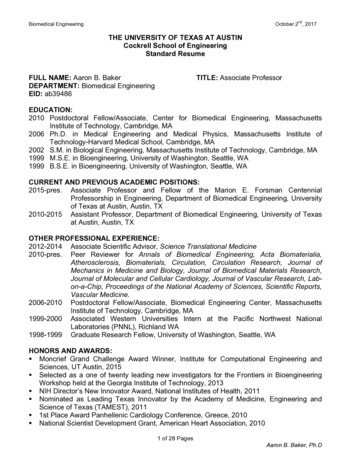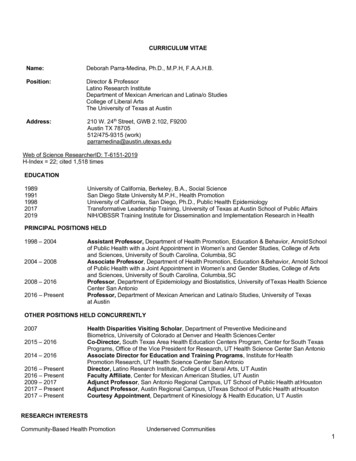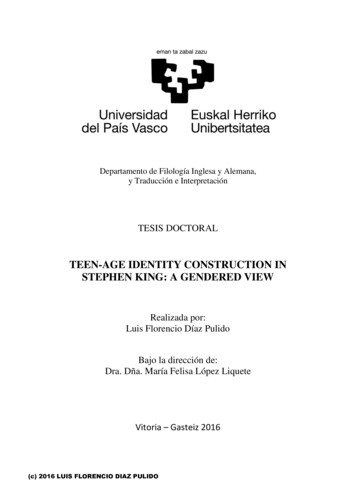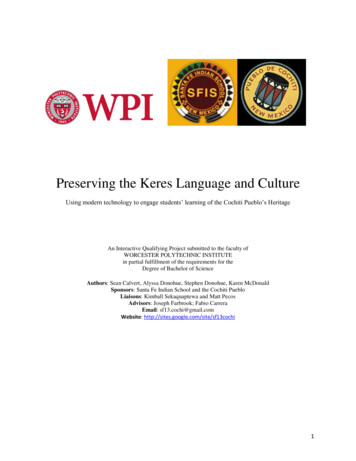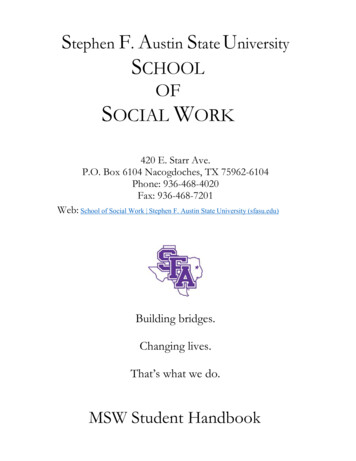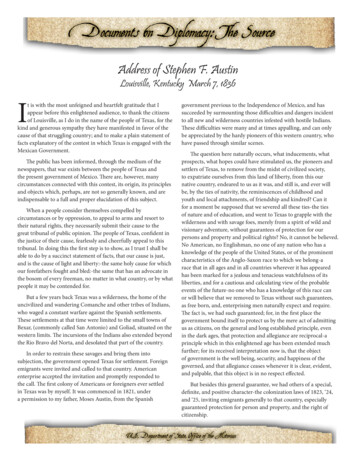
Transcription
Documents on Diplomacy: The SourceAddress of Stephen F. AustinLouisville, Kentucky March 7, 1836It is with the most unfeigned and heartfelt gratitude that Iappear before this enlightened audience, to thank the citizensof Louisville, as I do in the name of the people of Texas, for thekind and generous sympathy they have manifested in favor of thecause of that struggling country; and to make a plain statement offacts explanatory of the contest in which Texas is engaged with theMexican Government.The public has been informed, through the medium of thenewspapers, that war exists between the people of Texas andthe present government of Mexico. There are, however, manycircumstances connected with this contest, its origin, its principlesand objects which, perhaps, are not so generally known, and areindispensable to a full and proper elucidation of this subject.When a people consider themselves compelled bycircumstances or by oppression, to appeal to arms and resort totheir natural rights, they necessarily submit their cause to thegreat tribunal of public opinion. The people of Texas, confident inthe justice of their cause, fearlessly and cheerfully appeal to thistribunal. In doing this the first step is to show, as I trust I shall beable to do by a succinct statement of facts, that our cause is just,and is the cause of light and liberty:-the same holy cause for whichour forefathers fought and bled:-the same that has an advocate inthe bosom of every freeman, no matter in what country, or by whatpeople it may be contended for.But a few years back Texas was a wilderness, the home of theuncivilized and wandering Comanche and other tribes of Indians,who waged a constant warfare against the Spanish settlements.These settlements at that time were limited to the small towns ofBexar, (commonly called San Antonio) and Goliad, situated on thewestern limits. The incursions of the Indians also extended beyondthe Rio Bravo del Norta, and desolated that part of the country.In order to restrain these savages and bring them intosubjection, the government opened Texas for settlement. Foreignemigrants were invited and called to that country. Americanenterprise accepted the invitation and promptly responded tothe call. The first colony of Americans or foreigners ever settledin Texas was by myself. It was commenced in 1821, undera permission to my father, Moses Austin, from the Spanishgovernment previous to the Independence of Mexico, and hassucceeded by surmounting those difficulties and dangers incidentto all new and wilderness countries infested with hostile Indians.These difficulties were many and at times appalling, and can onlybe appreciated by the hardy pioneers of this western country, whohave passed through similar scenes.The question here naturally occurs, what inducements, whatprospects, what hopes could have stimulated us, the pioneers andsettlers of Texas, to remove from the midst of civilized society,to expatriate ourselves from this land of liberty, from this ournative country, endeared to us as it was, and still is, and ever willbe, by the ties of nativity, the reminiscences of childhood andyouth and local attachments, of friendship and kindred? Can itfor a moment be supposed that we severed all these ties-the tiesof nature and of education, and went to Texas to grapple with thewilderness and with savage foes, merely from a spirit of wild andvisionary adventure, without guarantees of protection for ourpersons and property and political rights? No, it cannot be believed.No American, no Englishman, no one of any nation who has aknowledge of the people of the United States, or of the prominentcharacteristics of the Anglo-Saxon race to which we belong-arace that in all ages and in all countries wherever it has appearedhas been marked for a jealous and tenacious watchfulness of itsliberties, and for a cautious and calculating view of the probableevents of the future-no one who has a knowledge of this race canor will believe that we removed to Texas without such guarantees,as free born, and, enterprising men naturally expect and require.The fact is, we had such guaranteed; for, in the first place thegovernment bound itself to protect us by the mere act of admittingus as citizens, on the general and long established principle, evenin the dark ages, that protection and allegiance are reciprocal-aprinciple which in this enlightened age has been extended muchfurther; for its received interpretation now is, that the objectof government is the well being, security, and happiness of thegoverned, and that allegiance ceases whenever it is clear, evident,and palpable, that this object is in no respect effected.But besides this general guarantee, we had others of a special,definite, and positive character-the colonization laws of 1823, ‘24,and ‘25, inviting emigrants generally to that country, especiallyguaranteed protection for person and property, and the right ofcitizenship.U.S. Department of State, Office of the Historian
Documents on Diplomacy: The SourceWhen the federal system and constitution were adoptedin 1824, and the former provinces became states, Texas, byher representative in the constituent congress, exercised theright which was claimed and exercised by all the provinces, ofretaining within her own control, the rights and powers whichappertained to her as one of the unities or distinct societies, whichconfederated together to form the federal republic of Mexico. Butnot possessing at that time sufficient population to become a stateby herself, she was with her own consent, united provisionallywith Coahuila, a neighbouring province or society, to form thestate of COAHUILA AND TEXAS, “until Texas possessed thenecessary elements to form a separate state of herself.” I quote thewords of the constitutional or organic act passed by the constituentcongress of Mexico, on the 7th of May, 1824, which establishes thestate of Coahuila and Texas. This law, and the principles on whichthe Mexican federal compact was formed, gave to Texas a specificpolitical existence, and vested in her inhabitants the special andwell defined rights of self-government as a state of the Mexicanconfederation, so soon as she “possessed the necessary elements.”Texas consented to the provisional union with Coahuila on thefaith of this guarantee. It was therefore a solemn compact, whichneither the state of Coahuila and Texas, nor the general governmentof Mexico, can change without the consent of the people of Texas.In 1833 the people of Texas, after a full examination of theirpopulation and resources, and of the law and constitution, decided,in general convention elected for that purpose, that the periodhad arrived contemplated by said law and compact of 7th May,1824, and that the country possessed the necessary elements toform a state separate from Coahuila. A respectful and humblepetition was accordingly drawn up by this convention, addressedto the general congress of Mexico, praying for the admission ofTexas into the Mexican confederation as a state. I had the honorof being appointed by the convention the commissioner or agentof Texas to take this petition to the city of Mexico, and present itto the government. I discharged this duty to the best of my feebleabilities, and, as I believed, in a respectful manner. Many monthspassed and nothing was done with the petition, except to refer itto a committee of congress, where it slept and was likely to sleep. Ifinally urged the just and constitutional claims of Texas to becomea state in the most pressing manner, as I believed it to be my dutyto do; representing also the necessity and good policy of thismeasure, owning to the almost total want of local government ofany kind, the absolute want of a judiciary, the evident impossibilityof being governed any longer by Coahuila, (for three fourths ofthe legislature were from there,) and the consequent anarchy anddiscontent that existed in Texas. It was my misfortune to offend thehigh authorities of the nation-my frank and honest exposition ofthe truth was construed into threats.”At this time (September and October, 1833,) a revolution wasraging in many parts of the nation, and especially in the vicinityof the city of Mexico. I despaired of obtaining anything, andwrote to Texas, recommending to the people there to organize asa state de facto without waiting any longer. This letter may havebeen imprudent, as respects the injury it might do me personally,but how far it was criminal or treasonable, considering therevolutionary state of the whole nation, and the peculiar claims andnecessities of Texas, impartial men must decide. It merely expressedan opinion. This letter found its way from San Antonio de Bexar,(where it was directed) to the government. I was arrested at Saltillo,two hundred leagues from Mexico, on my way home, taken backto that city and imprisoned one year, three months of the time insolitary confinement, without books or writing materials, in a darkdungeon of the former inquisition prison. At the close of the yearI was released from confinement, but detained six months in thecity on heavy ball. It was nine months after my arrest before I wasofficially informed of the charges against me, or furnished with acopy of them. The constitutional requisites were not observed, myconstitutional rights as a citizen were violated, the people of Texaswere outraged by this treatment of their commissioner, and theirrespectful, humble and just petition was disregarded.These acts of the Mexican government, taken in connexion withmany others and with the general revolutionary situation of theinterior of the republic, and the absolute want of local governmentin Texas, would have justified the people of Texas in organizingthemselves as a State of the Mexican confederation, and if attackedfor so doing in separating from Mexico. They would have beenjustifiable in doing this, because such acts were unjust, ruinousand oppressive, and because self-preservation required a localgovernment in Texas suited to the situation and necessities of thecountry, and the character of its inhabitants. Our forefathers in ‘76flew to arms for much less. They resisted a principle, “the theoryof oppression,” but in our case it was the reality - it was a denial ofjustice and of our guarantied rights - it was oppression itself.Texas, however, even under these aggravated circumstancesforbore and remained quiet. The constitution, although outragedand the sport of faction and revolution, still existed in name, andthe people of Texas still looked to it with the hope that it would besustained and executed, and the vested rights of Texas respected.I will now proceed to show how this hope was defeated by thetotal prostration of the constitution, the destruction of the federalsystem, and the dissolution of the federal compact. It is well knowsthat Mexico has been in constant revolutions and confusion,with only a few short intervals, ever since its separation for Spainin 1821. This unfortunate state of things has been produced bythe effects of the ecclesiastical and aristocratical party to opposerepublicanism, overturn the federal system and constitution, andestablish a monarchy, or a consolidated government of some kind.Address of Stephen F. Austin (1836): Page 2
Documents on Diplomacy: The SourceIn 1834, the President of the Republic, Gen. Santa Anna, whoheretofore was the leader and champion of the republican partyand system, became the head and leader of his former antagoniststhe aristocratic and church party. With this accession of strength,this party triumphed. The constitutional general Congress of1834, which was decidedly republican and federal, was dissolvedin May of that year by a military order of the President beforeits constitutional term had expired. The council of governmentcomposed of half the Senate which, agreeably to the constitution,ought to have been installed the day after closing the sessionof Congress, was also dissolved; and a new, revolutionary, andunconstitutional Congress was convened by another militaryorder of the President. This Congress met on the 1st of January,1835. It was decidedly aristocratic, ecclesiastical and central in itspolitics. A number of petitions were presented to it from severaltowns and villages, praying that it would change the federal formof government and establish a central form. These petitions wereall of a revolutionary character, and were called pronunciamientos,or prenouncements for centralism. They were formed by partialand revolutionary meetings gotten up by the military and priests.Petitions in favour of the federal system and constitution, andprotests against such revolutionary measures, were also sent in bythe people and by some of the State Legislatures, who still retainedfirmness to express their opinions. The latter were disregardedand their authors persecuted and imprisoned. The former wereconsidered sufficient to invest Congress with plenary powers.It accordingly, by a decree, deposed the constitutional VicePresident, Gomez Farias, who was a leading federalist, withoutany impeachment or trial, or even the form of a trial, and electedanother of their own party, Gen. Barragan, in his place. By anotherdecree it united the Senate with the House of Representatives inone chamber, and thus constituted, it declared itself invested withfull powers as a national convention. In accordance with theseusurped powers, it proceeded to annul the federal constitution andsystem, and to establish a central or consolidated government. Howfar it has progressed in the details of this new system is unknown tous. The decree of the 3d of October last, which fixes the outlines ofthe new government, is however sufficient to show that the federalsystem and compact is dissolved and centralism established. TheStates are converted into departments. This decree is as follows astranslated:Decree of the 3d October, 1835Office of the First Secretary of State, Interior Department.“His Excellency the President pro tem. of the Mexican United States to theinhabitants of the Republic. Know ye, that the General Congress has decreedthe following:“ART. 1. The present Governors of the States shall continue, notwithstandingthe time fixed by the Constitution may have expired; but they shall bedependent for their continuance in the exercise of their attributes upon thesupreme government of the nation.“ART. 2. The Legislatures shall immediately cease to exercise their legislativefunctions; but before dissolving (and those which may be in recess meetingfor the purpose) they shall appoint a department council, composed forthe present of five individuals, chosen either within or without their ownbody, to act as a council to the governor; and in case of a vacancy in thatoffice, they shall propose to the supreme general government three persons,possessing the qualifications hitherto required; and until an appointment bemade, the gubernatorial powers shall be exercised by the first on the list, whois not an ecclesiastic.“ART. 3. In those States where the Legislatures cannot be assembled withineight days, the ayuntamientos [similar to the mayor and council in the UnitedStates] of the capital shall act in its place, only for the purpose of electing thefive individuals of the department council.“ART. 4. All the judges and tribunals of the States, and the administration ofjustice, shall continue as hitherto, until the organic law relative to the branchbe formed. The responsibilities of the functionaries which could only beinvestigated before Congress, shall be referred to and concluded before thesupreme count of the nation.“ART. 5. All the subaltern officers of the State shall also continue for thepresent, (the places which are vacant, or which may be vacated, not to befilled,) but they, as well as the offices, and branches under their charge, shallbe subject to and at the disposal of the supreme government of the nation, bymeans of their respective governors.” - City of Mexico, Oct. 3d, 1835.MIQUEL BARRAGAN, President, pro. tem.Manuel Dias De Bonilla, Secretary of State.For the information of those who are not acquainted with theorganization of the Mexican Republic under the federal systemand constitution of 1824, it may be necessary to state that thisconstitution is copied, as to its general principles, from that of theUnited States. The general Congress had the same organization insubstance and was elected in the same manner. A Senate elected bythe State Legislatures for four years, and a House of Representativeselected by the people for two years. A President and Vice Presidentelected for four years, and removable only by impeachment andtrial. The mode of amending the constitution was clearly fixed. Thepowers of the States were the same in substance as the States of theUnited States, and in some instances greater. In addition to this,during the recess of Congress, half the Senate formed the council ofgovernment.By keeping these facts in view, and then supposing the casethat the President and Congress of these United States were to do,what the President and Congress of Mexico have done, and thatone of the states was to resist, and insist on sustaining the federalconstitution and state rights, and a parallel case would be presentedof the present contest between Texas and the revolutionarygovernment of Mexico.In further elucidation of this subject, I will present an extractfrom a report made by me to the provisional government of Texason the 30th of November last, communicating the said decree of 3dOctober.Address of Stephen F. Austin (1836): Page 3
Documents on Diplomacy: The SourceThat every people have the right to change their government, isunquestionable; but it is equally certain and true, that this change, to bemorally or politically obligatory, must be effected by the free expression ofthe community, and by legal and constitutional means; for otherwise, thestability of governments and the rights of the people, would be at the mercyof fortunate revolutionists, of violence, or faction.Admitting, therefore, that a central and despotic, or strong government, isbest adapted is the education and habits of a portion of the Mexican people,and that they wish it; this does not, and cannot, give to them the right todictate, by unconstitutional means and force, to the other portion who haveequal rights, and differ in opinion.Had the change been affected by constitutional means, or had a nationalconvention been convened, and every member of the confederacy been fairlyrepresented, and a majority agreed to the change, it would have placed thematter on different ground; but, even then, it would be monstrous to admitthe principle, that a majority have the right to destroy the minority, for thereason, that self-preservation is superior to all political obligations. That sucha government as is contemplated by the before mentioned decree of the 3dof October, would destroy the people of Texas, must be evident to all, whenthey consider its geographical situation, so remote from the contemplatedcentre of legislation and power; populated as it is, by a people who are sodifferent in education, habits, customs, languages, and local wants, from allthe rest of the nation; and especially when a position of the central partyhave manifested violent religious and other prejudices and jealousies againstthem. But no national convention was convened, and the constitution hasbeen, and now is, violated and disregarded. The constitutional authorities ofthe State of Coahuilla and Texas, solemnly protested against the change ofgovernment, for which act they were driven by military force from office, andimprisoned. The people of Texas protested against it, so they had a right todo, for which they have been declared rebels by the government in Mexico.However necessary, then, the basis established by the decree of the 3d ofOctober, may be to prevent civil wars and anarchy in other parts of Mexico,it is to be effected by force and unconstitutional means. However beneficialit may be to some parts of Mexico, it would be ruinous in Texas. This viewpresents the whole subject to the people. If they submit in a forcible andunconstitutional destruction of the social compact, which they have swornto support, they disregard their duty to themselves, and violate the first lawwhich God stamped upon the heart of men, civilized or savage; which is thelaw or the right of self-preservation.The decree of the 3d October, therefore, if carried into effect, evidently leavesno remedy for Texas but resistance, secession from Mexico, and a direct tonatural rights.These revolutionary measures of the party who had usurpedthe government of Mexico, were resisted by the people in the statesof Puebla, Oaxaca, Mexico, Jalisco, and other parts of the nation.The state of Zacatccas took up arms, but its efforts were crushedby an army, headed by the president, General Santa Anna, inperson; and the people of that state were disarmed, and subjectedto a military government. In October last, a military force wassent to Texas, under Gen. Cos, for the purpose of enforcing theseunconstitutional and revolutionary measures, as had been done inZacatecas, and other parts of the nation. This act roused the peopleof Texas, and the war commenced.Without exhausting the patience by a detail of numerousother vexatious circumstances, and violations of our rights, I trustthat what I have said on this point, is sufficient to show that thefederal social compact of Mexico is dissolved; that we have just andsufficient cause to take arms against the revolutionary governmentwhich has been established; that we have forborne until the cup wasfull to overflowing; and that further forbearance or submission onour part would have been both ruinous and degrading; and that itwas due to the great cause of liberty, to ourselves, to our posterity,and to the free blood which I am proud to say, fills our veins,to resist and proclaim war against such acts of usurpation andoppression.The justice of our cause being clearly shown, the next importantquestion that naturally presents itself to the intelligent andinquiring mind, is, what are the objects and intentions of the peopleof Texas?To this we reply, that our object is freedom—civil and religiousfreedom—emancipation from that government, and that people,who, after fifteen years experiment, since they have been separatedfrom Spain, have shown that they are incapable of self-government,and that all hopes of any thing like stability or rational liberty intheir political institutions, at least for many years, are vain andfallacious.This object we expect to obtain, by a total separation fromMexico, as an independent community, a new republic, or bybecoming a state of the United States. Texas would have beensatisfied to have been a state of the Mexican Confederation, and shemade every constitutional effort in her power to become one. Butthat is no longer practicable, for that confederation no longer exists.One of the two alternatives above mentioned, therefore, is the onlyresource which the revolutionary government of Mexico has lefther. Either will secure the liberties and prosperity of Texas, foreither will secure to us the right of self-government over a countrywhich we have redeemed from the wilderness, and conqueredwithout any aid or protection whatever from the Mexicangovernment, (for we never received any,) and which is clearly ours.Ours, by every principle on which original titles to countries are,and ever have been founded. We have explored and pioneered it,developed its resources, made it known to the world, and givento it a high and rapidly increasing value. The federal republic ofMexico had a constitutional right to participate generally in thisvalue, but it had not, and cannot have any other; and this onehas evidently been forfeited and destroyed by unconstitutionalacts and usurpation, and by the total dissolution of the socialcompact. Consequently, the true and legal owners of Texas, the onlylegitimate sovereigns of that country, are the people of Texas.It is also asked, what is the present situation of Texas, and whatare our resources to effect our objects, and defend our rights?The present position of Texas is an absolute Declaration ofIndependence—a total separation from Mexico. . . .Address of Stephen F. Austin (1836): Page 4
Documents on Diplomacy: The SourceIt is worthy of particular attention that this declaration affordsanother and unanswerable proof of the forbearance of the Texans,and of their firm adherence, even to the last moment, to theconstitution which they had sworn to support, and to their politicalobligations as Mexican citizens. For, although at this very timethe federal system and constitution of 1824, had been overturnedand trampled under foot by military usurpation, in all other partsof the republic, and although our country was actually invadedby the usurpers for the purpose of subjecting us to the militaryrule, the people of Texas still said to the Mexican nation— “restorethe federal constitution and govern in conformity to the socialcompact, which we are all bound by our oaths to sustain, and wewill continue to be a member of the Mexican Confederation.”This noble and generous act, for such it certainly was, under thecircumstances, is of itself sufficient to repel and silence the falsecharges which the priests and despots of Mexico have made of theingratitude of the Texans. In what does this ingratitude consist?I cannot see, unless it be in our enterprise and perseverance, ingiving value to a country that the Mexicans considered valueless,and thus exciting their jealousy and cupidity.To show more strongly the absurdity of this charge ofingratitude made by the general government of Mexico, and of thepretended claims to liberality, which they set up, for having givenfortunes in land to the settlers of Texas, it must be remembered,that with the exception of the first three hundred families, settledby myself, the general government have never granted or givenone foot of land in Texas. The vacant land belonged to the stateof Coahuila and Texas, so long as they remained united, and toTexas so soon as she was a state, separate from Coahuila. Since theadoption of the federal system in 1824, the general governmenthave never had any power or authority whatever to grant, sell,or give any land in Texas, nor in any other state. This power wasvested in the respective states. The lands of Texas have thereforebeen distributed by the state of Coahuila and Texas (with theexception of the three hundred families above mentioned) and notby the general government, and, consequently, it is truly absurdfor that government to assume any credit for an act in which ithad no participation, and more especially when it has for yearspast thrown every obstacle in the way, to impede the progressof Texas, as is evident from the 11th article of the law of the 6thApril, 1830, which absolutely prohibited the emigration to Texasof citizens of the United States; and many other acts of a similarnature—such as vexatious custom-house regulations, passports,and garrisoning the settled parts of the country where troops werenot needed to protect it from the Indians, nor from any otherenemy. It is therefore clear that if any credit for liberality is due, itis to the state government, and how far it is entitled to this credit,men of judgment must decide, with the knowledge of the fact thatit sold the lands of Texas, at from thirty to fifty dollars per squareleague, Mexican measure, which is four thousand four hundred andtwenty-eight acres English, and considered they were getting a highprice and full value for it.The true interpretation of this charge of ingratitude is asfollows: The Mexican government have at last discovered thatthe enterprising people who were induced to remove to Texasby certain promises and guaranties, have by their labours givenvalue to Texas and its lands. An attempt is therefore now made totake them from us and to annul all those guaranties, and we areungrateful because we are not sufficiently “docile” to submit to thisusurpation and injustice as the “docile” Mexicans have in otherparts of the nation.To close this matter about ingratitude, I will ask—if it was notingratitude in the people of the United States to resist the “theoryof oppression” and separate from England? Can it be ingratitudein the people of Texas to resist oppression and usurpation byseparating from Mexico?To return to the declaration of the 7th of November last, it willbe observed that it is a total separation from Mexico—an absolutedeclaration of independence—in the event of the destruction of thefederal compact or system, and the establishment of centralism.This event has taken place. The federal compact is dissolved, anda central or consolidated government is established. I thereforerepeat that the present position of Texas is absolute independence:a position in which we have been placed by the unconstitutionaland revolutionary acts of the Mexican government. The people ofTexas firmly adhered to the last moment, to the constitution whichthey and the whole nation had sworn to support. The governmentof Mexico have not—the party now in power have overturned theconstitutional government and violated their oaths—they haveseparated from their obligations, from their duty and from thepeople of Texas; and, consequently, they are the true rebels. So farfrom being grateful, as they ought to be, to the people of Texas forhaving given value to that country, and for having adhered to theirduty and constitutional obligations, the Mexicans charge us withthese very acts as evidence of ingratitude. Men of judgment andimpartiality must decide this point, and determine who has been,and now is ungrateful, and who are the true rebels.In order to make the position of Texas more clear to the world,a convention has been called to meet the first of March, and isno doubt, now in session, for t
Address of Stephen F. Austin (1836): Page 3 In 1834, the President of the Republic, Gen. Santa Anna, who heretofore was the leader and champion of the republican party and system, became the head and leader of his former antagonists-the aristocratic and church party. With this accession of strength, this party triumphed.
